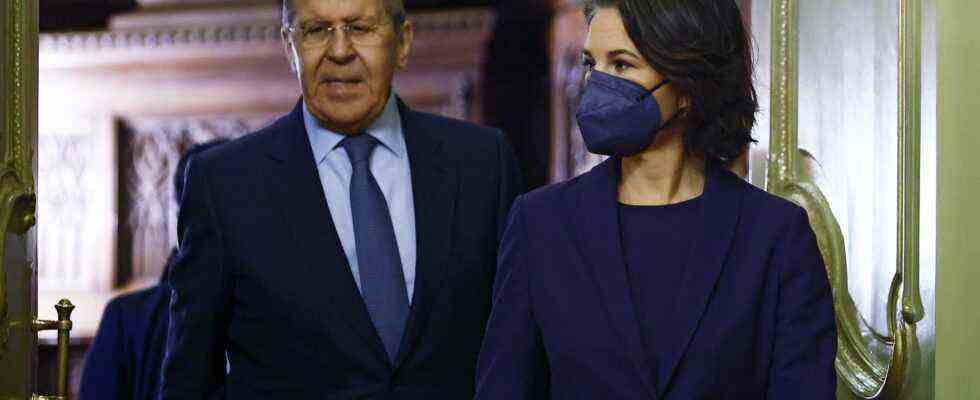comment
Status: 01/18/2022 5:20 p.m
Foreign Minister Baerbock and Chancellor Scholz have made Germany’s position in the Ukraine conflict clear: communication instead of confrontation, but without glossing over Russia’s behavior. That’s right.
We can still talk to each other. That was the message from Germany’s first ambassador, Foreign Minister Annalena Baerbock, in Moscow today. Talking – not against each other, but with each other. Two and a half long hours. Much longer than planned. But don’t sugarcoat it, because Baerbock explained unequivocally in Moscow today what Germany and the European, Western and also many of the Eastern partners mean when dealing with Moscow. Until here and not further.
Anyone who thought that Baerbock, who has been in office for less than two months, would be presented by Foreign Minister Lavrov, who has seen others come and go on the world stage for 18 years, was very wrong. “We didn’t choose this situation, but we can’t and won’t avoid it,” said Baerbock, as confident as he was right.
If you talk, don’t shoot
But the fact that Europe did exactly that for years on the subject of Russia, until finally finding no line, has been used by Putin up to now. Who does the man from Moscow actually still take seriously in Europe? He respected Merkel. Incidentally, she was the one who spoke even when everyone and everything had come up against a wall of silence. For her, “change through rapprochement” meant: “acting through calling”. If you talk, don’t shoot.
But 100,000 soldiers on the Ukrainian border are no longer a diplomatic argument. Or as Baerbock put it bluntly next to Lavrov today: 100,000 soldiers are very difficult not to be understood as a threat. Baerbock nevertheless emphasized what they had in common with Moscow, stretched out his hand, but did not conceal what separated them. Navalny. Assassination on German soil. Threatened human rights in Russia. Lavrov, who can humiliate when he wants, stood by and listened.
Uncertainty the more effective lever
An offer of dialogue later as the first message from the Chancellery. But like Baerbock in Moscow, Chancellor Olaf Scholz, alongside NATO Secretary General Jens Stoltenberg in Berlin, is very clear today: “We expect Russia to de-escalate. This could include a troop reduction,” said Scholz. And the chancellor is sticking to his wise line: why explain to Putin all the sanctions that could be on the table when the uncertainty about them is the more effective lever.
Scholz repeated it in three variations today. Any Russian aggression would have major consequences, he said. Everything is up for discussion. Anyone who is still in their right mind now knows at the latest that everything is part of it. The Nord Stream 2 gas pipeline.
The unfortunate project initiated by the ex-chancellor and supported by today’s lobbyist Gerhard Schröder is now on the table, along with many other painful sanctions. Good this way.
Baerbock’s inaugural visit, Scholz’s clear words, neither will change Moscow’s attitude towards Ukraine overnight. If anything. But there have been worse days in the Ukraine conflict. Or as Baerbock says. There is no alternative to stable relationships.
Editorial note
Comments always reflect the opinion of the respective author and not that of the editors.
Talking helps: Baerbock in Moscow, Scholz in Berlin
Georg Schwarte, ARD Berlin, 18.1.2022 5:18 p.m

